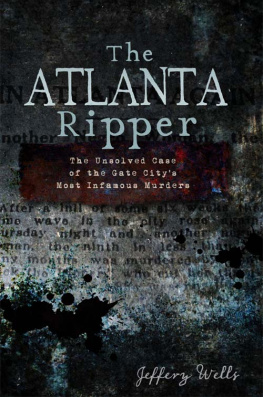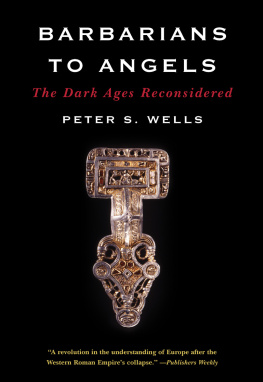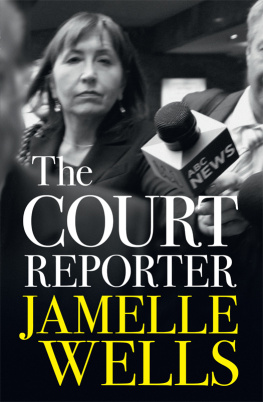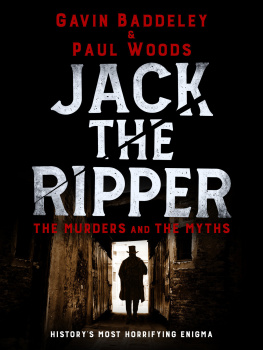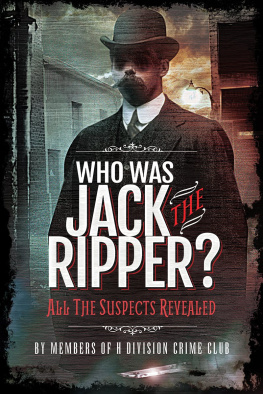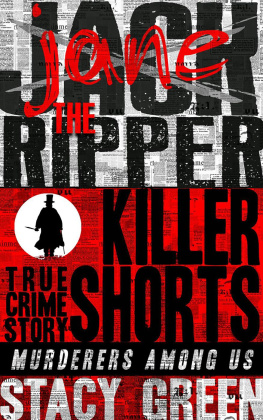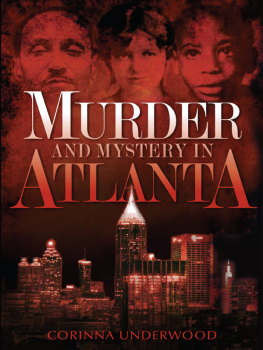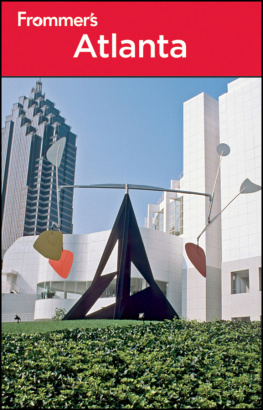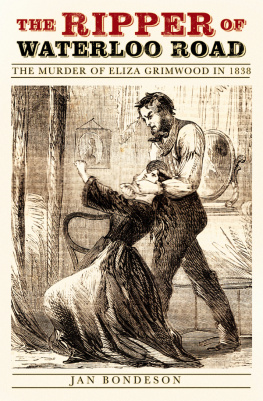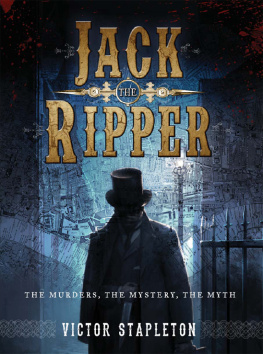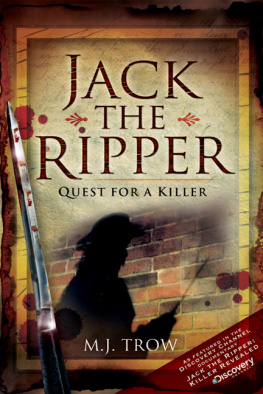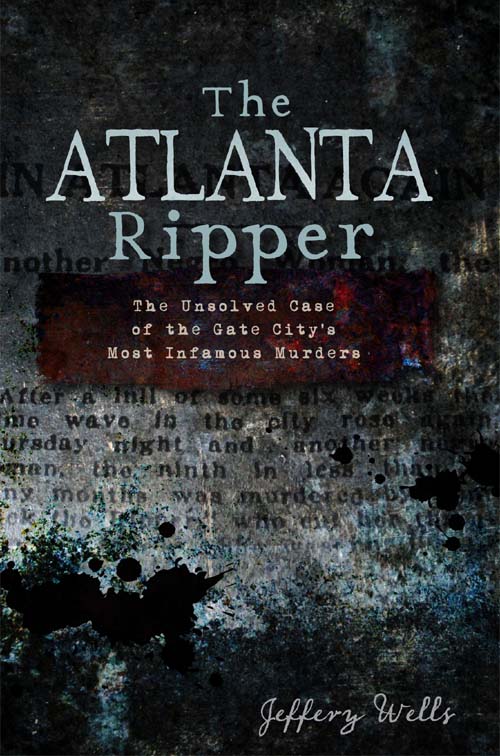

The Unsolved Case
of the Gate City's
Most Infamous Murders


Published by The History Press
Charleston, SC 29403
www.historypress.net
Copyright 2011 by Jeffery Wells
All rights reserved
First published 2011
e-book edition 2011
ISBN 978.1.61423.182.0
Library of Congress Cataloging-in-Publication Data
Wells, Jeffrey C.
The Atlanta Ripper : the unsolved case of the Gate City's most infamous murder / Jeffrey Wells.
p. cm.
Atlanta Ripper Murders.
Includes bibliographical references.
print edition ISBN 978-1-60949-381-3
1. Serial murderers--Georgia--Atlanta. 2. Atlanta (Ga.)--History. I. Title.
HV6534.A7W45 2011
364.15232092--dc23
2011025751
Notice: The information in this book is true and complete to the best of our knowledge. It is offered without guarantee on the part of the author or The History Press. The author and The History Press disclaim all liability in connection with the use of this book.
All rights reserved. No part of this book may be reproduced or transmitted in any form whatsoever without prior written permission from the publisher except in the case of brief quotations embodied in critical articles and reviews.
This book is dedicated to the women who needlessly lost their lives on the streets of Atlanta during the epic known as the Atlanta Ripper Murders and to Mary Yedell and Emma Lou Sharpe, who both lived to tell about their encounters with the ruthless murderer. What you must have had to endure each night in your dreams would be a curse that should not be wished on any mortal.
In addition, I would like to dedicate this book to the man who taught me how to ride a bicycle and drive an automobile, my grandfather James Taylor. Your love, guidance and wisdom helped me learn how to stand on my own two feet and face the world. Thank you for your many years of hard work and dedication to all of us. You are gone but not forgotten!
Our good people are under the bondage of a narrow theology. Each man is bent on saving his own soul. The only way to save one's soul is by saving the soul of another.
Reverend Dr. Henry Hugh Proctor, 1917
C ONTENTS
A CKNOWLEDGEMENTS
As with any project, it was impossible to accomplish the research, writing and publishing of this book alone. First, I would like to express my continued appreciation for The History Press. Not only were they kind in accepting the proposal for this book, but they were also an excellent partner in the publication of my first book, In Atlanta or in Hell: The Camp Creek Train Crash of 1900.
In addition, I would like to thank those who have supported my efforts throughout the writing of this book. First, I would like to thank my photographer and best friend, Russ Gowin. The pictures are excellent, and I am more than grateful to you for taking your weekend time to help me track down the areas where these murders took place and get those photos. I am also grateful to Rebecca and Karen for agreeing to tag along with us to find those locations. I never knew there were so many little neighborhoods in Atlanta where you could easily get lost. Thank you to all three of you for helping me with that part of the project.
I am also continually grateful to the library associates at Georgia Military College. Their foresight in bringing the Atlanta Constitution historical database to our college library has not only helped me teach my college classes better but has also given me a venue through which I can research topics such as the one covered in this book. My gratitude is also extended to the director of our campus in Fairburn, Debbie Condon, and our dean, Roy McClendon. Your continued confidence in my abilities and support of my writing have been key to my being able to complete this project and numerous others.
I would also like to offer my thanks to Susan Prosser, our campus librarian. Her enthusiasm for my work, as well as her assistance in tracking down articles and other sources, has been important as I trudged along the pathway that led to this work.
Finally, I would like to thank the gang at Bell, Book and Candle in McDonough. To Caprice and the Asbury family, I would like to offer my thanks for always encouraging me and opening your bookstore to me and my friends. Thank you for always providing a venue for my book signings and continued moral support during them. To Dan and Jan, thank you for being such lovers of books and history. Without encouragement from you, I would never have wanted to take the dive into local and regional history.
I NTRODUCTION
For anyone paying attention in the last few decades, the growth of Atlanta has been phenomenal. From its beginnings as the terminus of the Western and Atlantic Railroad to its being named as the home of the 1996 International Olympic Games, the story of Atlanta is one that would not really have been imagined by even the most gifted of fiction writers. Like any other metropolis, the city has its glistening, beaming skyscrapers towering above the landscape; its heavily trafficked interstates crisscrossing the terrain; its millions of citizens commuting by car, by rail and on foot to their work destinations throughout the area; and, unfortunately, its seedy history chock full of deceit, mayhem, racial unrest and murder. These pages of its history, though unpleasant, have long attracted those who not only enjoy a good reading of local history but who also like a good crime story or murder mystery. It is in these pages that our story begins.
In the early years of the twentieth century in Atlanta, the African American community was rocked by many tragic happenings. Among those was the notorious 1906 Atlanta Race Riot. However, a few years after this tumult, there was born a crime spree that ended in the deaths of a few dozen women in the African American community. Because of the nature of the killings, as well as the number of them, many in the press began to refer to these murders as the work of an Atlanta Ripper. One must not forget that the murders were only separated from the series of killings in London's White Chapel district by a mere twenty-one years, for those who believe the Atlanta series of killings started in 1909, and twenty-three years for those who believe it started later, in 1911. Nevertheless, the thin passage of time between the London spree and that in Atlanta led many to hang that moniker on the murderer behind the killings in the Gate City.
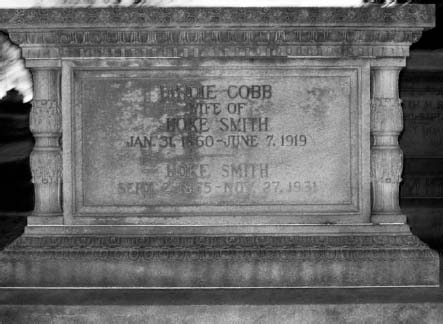
The grave of Governor Hoke Smith, whose racial politics in 1906 contributed to the deadly race riot in Atlanta.
Once again, there is much discussion about whether these murders began earlier than 1911, but what is not contested is the effect this killing spree had on the city and its citizens, particularly in the black community. For months, even years, the young women of the Gate City were afraid to leave their homes after dark, and some feared to tread the city streets even during daylight hours. Leaders in the African American community began to unite in their insistence that the Atlanta Police Department commit as many resources as possible to tracking down the killer(s) and putting an end to the reign of terror in their community. It was not long before the mayor of Atlanta, Courtland Winn, and the governor of Georgia, Hoke Smith, joined in this effort.

